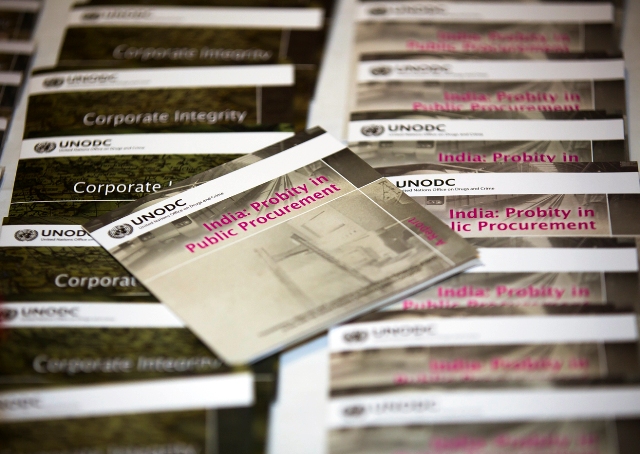India: Countering corruption in the private sector: a shared responsibility

The private sector in India is vibrant and growing - accounting for a large share of the country's gross domestic product (GDP). Around 25 percent of the GDP can be attributed to public procurement with the private sector being a main supplier of goods and services. Public procurement in India takes place both at the central and state level with over 35 ministries at the central level, 28 states and 7 union territories procuring independently. Recognizing the emerging and growing role of the private sector, also the role and impact of corruption within the sector has been increasingly debated. Over the last few years with a national anti-corruption movement gaining momentum in India, civil society has become more vigilant requesting a zero tolerance approach to corruption.
In 2011, after India ratified the United Nations Convention against Corruption, the United Nations Office on Drugs and Crime started two initiatives aiming at encouraging corporate integrity and probity in public procurement. To this end, UNODC commissioned two studies: (i) Incentives for corporate integrity in accordance with the United Nations Convention against Corruption (UNCAC) and (ii) Transparency, objectivity and competition in private public partnership projects.
 Both studies assessed the compliance of existing and proposed legislation with the UNCAC. They also identified current practices and challenges at the grassroot level for both corporate integrity and probity in procurement as perceived by the public and private sector as well as by law enforcement officials.
Both studies assessed the compliance of existing and proposed legislation with the UNCAC. They also identified current practices and challenges at the grassroot level for both corporate integrity and probity in procurement as perceived by the public and private sector as well as by law enforcement officials.
While both studies acknowledge that important legislation exists in India, under which corruption can currently be prevented and investigated, the Indian legal framework could be substantially strengthened by the enactment of a series of new bills, including (i) the Public Procurement Bill 2012, (ii) the Company Bill 2012, (iii) the Whistleblowers Protection Bill 2011, (iv) the Prevention of Bribery of Foreign Public Officials and Officials of Public International Organisations Bill, 2011 as well as the amendment to existing laws to include bribery in the private sector as a punishable offence.
Regarding the strengthening of corporate integrity, the study - based on a survey done - proposed a series of measures for several stakeholders involved: (i) promoting a collaborative approach between law enforcement and the private sector, (ii) training in economic crimes for law enforcement officials, (iii) need for whistleblower programmes and external audits, especially in larger companies, (iv) clear responsibility and accountability for integrity in the top management as well as (v) code of conducts for employees as integral part of contracts.
With respect to probity in procurement, the study analyzed specifically the public private partnership (PPP) approach as an increasingly used procurement model. It found that the enactment of the Public Procurement Bill and the draft rules on PPP would be an important step forward in regulating procurement under PPPs and thus promoting probity. In addition, it found that specific provisions were required to strengthen oversight for PPPs in the entire process from bidding through to implementation as well as to strengthen accountability of officials and consultants working under PPPs.
In general, during the discussion the audience agreed that more awareness and sensitization was needed across the board on ethical values and integrity and that a continuous dialogue across various sectors of society including the Government, private sector, civil society and the media was critical. Witness protection mechanisms as well as whistleblower policies are additional important mechanisms to strengthen the investigation and prosecution of corrupt acts.
Mr Sri Kumar, Vigilance Commissioner, Central Vigilance Commission expressed his appreciation for the studies emphasizing that the findings needed to be translated into action and be widely disseminated.
Let's walk the talk and act against corruption today!
The studies were carried out under two UNODC projects titled " Public-Private Partnership for Probity in Public Procurement" and "Incentives to Corporate Integrity and Cooperation in accordance with the United Nations Convention against Corruption" supported by the Siemens Integrity Initiative.
Click here to read:
Incentives for corporate integrity in accordance with the United Nations Convention against Corruption
Click here to read: Transparency, objectivity and competition in private public partnership projects.
